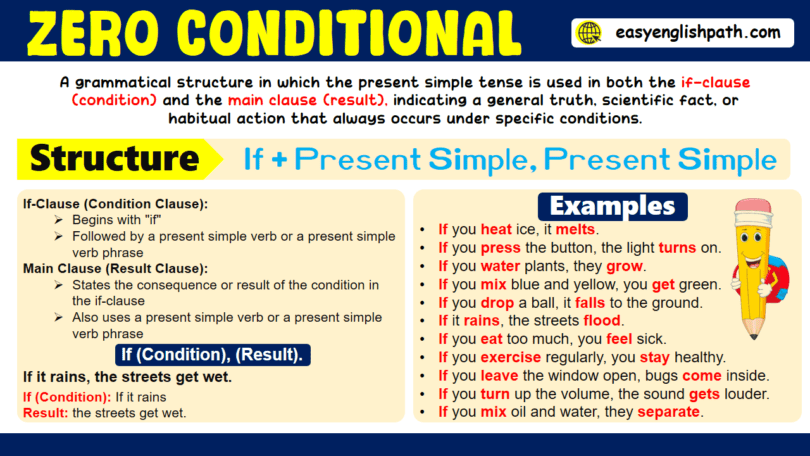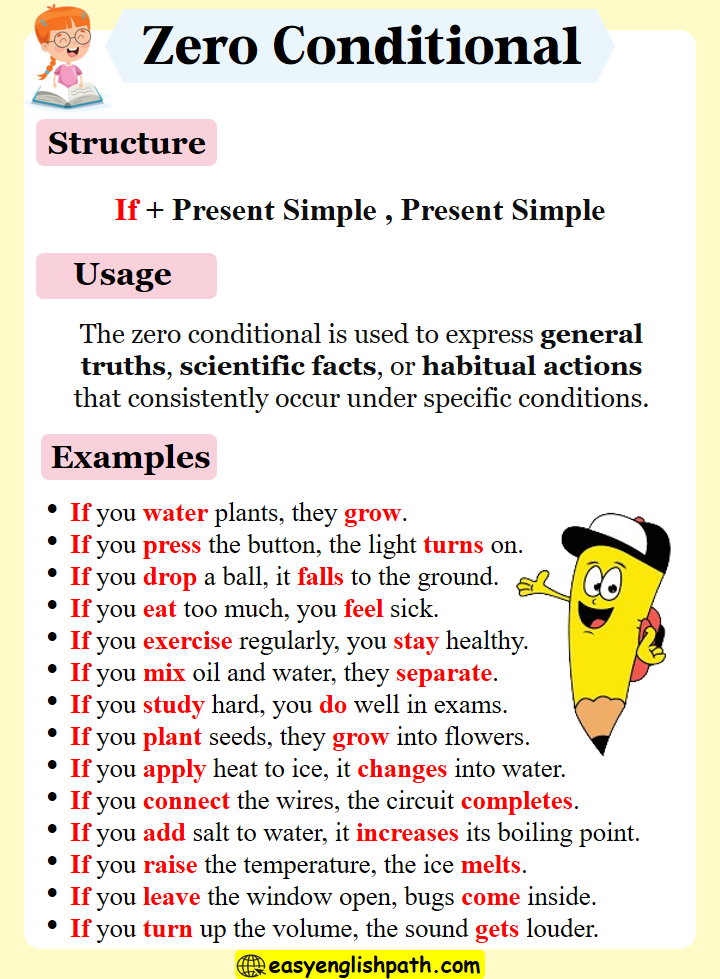The zero conditional is used for talking about general truths and things that always happen under certain conditions. Unlike other conditions, this one talks about facts, not guesses. We use it a lot in everyday talk to show how one thing leads to another. Understanding the Zero Conditional can help us a lot to say what we mean clearly and easily in English.
Zero Conditional Definition:
The Zero Conditional is a grammatical structure that is used to express general truths, and scientific facts that consistently happen under particular conditions.
Zero Conational Use:
We use the zero conditional to talk about things that are generally true, especially for laws and rules. The zero conditional uses the present simple tense in both clauses.
- If you water plants, they grow.
- If you press the button, the light turns on.
- If you drop a ball, it falls to the ground.
- If you eat too much, you feel sick.
The structure of a Zero Conditional:
The structure of a zero conditional sentence is:
| If + present simple, present simple |
Here’s are the explanation of the structure:
| If-clause (condition) | Main clause (result) |
| This part uses the present simple tense to describe a condition. | This part also uses the present simple tense to describe the result of the condition. |
For Examples:
- If you mix red and blue, you get purple.
- If you heat water to 100 degrees Celsius, it boils.
- If it rains, the ground gets wet.
In the above sentences, where are both the condition and the result are in the present simple tense, and the sentences express facts that are always true under the given conditions.
Difference Between If-Clause (Condition) and Main Clause (Result):
| If-Clause (Condition) | Main Clause (Result) |
| If you water plants, | they grow. |
| When you press the button, | the light turns on. |
| If a ball is dropped, | it falls to the ground. |
| Eating too much | leads to feeling sick. |
| Regular exercise | ensures staying healthy. |
| Leaving the window open | invites bugs inside. |
| Turning up the volume | makes the sound louder. |
| When oil and water are mixed, | they separate. |
| Studying hard | results in doing well in exams. |
| Planting seeds | leads to them growing into flowers. |
| Applying heat to ice | causes it to change into water. |
| Connecting the wires | completes the circuit. |
| Adding salt to water | increases its boiling point. |
| Raising the temperature | causes the ice to melt. |
Uses:
1. Zero conditional sentences often tell us the general truths, things that are universally or generally accepted as facts.
- If you drop an object, it falls.
- If the sun sets, it gets dark.
2. These sentences can also be used to describe scientific facts or laws of nature.
- If plants get sunlight, they perform photosynthesis.
- If you increase the pressure on a gas, its volume decreases.
3. They describe habitual actions or routines that always happen under specific conditions.
- If they finish work early, they watch a movie.
- If he reads before bed, he falls asleep faster.
4. They can also be used to give instructions or state rules that apply generally.
- If you press this button, the machine starts.
- If you turn the key, the car starts.
5. There are many proverbs and sayings that use the zero conditional to convey general wisdom or truths.
- If you give respect, you get respect.
- If you play with fire, you get burned.
Zero Conditional Examples:
- If you study, you learn.
- If you sleep, you rest.
- If you eat, you feel full.
- If you run, you move fast.
- If you drink, you quench your thirst.
- If you smile, you feel happier.
- If you listen, you hear sounds.
- If you read, you gain knowledge.
- If you write, you communicate ideas.
- If you wait, your patience grows.
You May Also Like this






